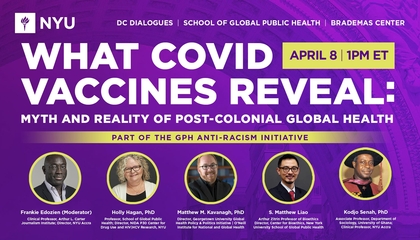While steady progress has been made administering COVID-19 vaccines in African countries, at the current rate of distribution 60 percent vaccine coverage will not be reached until 2023 -- an unacceptable reality.
At a recent event hosted by NYU Washington, DC, panelists discussed current developments in the COVID-19 vaccine rollout in Africa, including how a history of unethical medical care has influenced current approaches to vaccine distribution.
Led by moderator Frankie Edozien, journalism professor and site director of NYU Accra, panelists included Kodjo Senah, sociology professor at the University of Ghana; Matthew Kavanaugh, law professor and director of the Global Health Policy & Politics Initiative at Georgetown University; Holly Hagan, epidemiology professor at NYU GPH and director of the Center for Drug Use and HIV|HCV Research, and S. Matthew Liao, GPH professor and director of the NYU Center for Bioethics.
Dr. Hagan provided contextual background for the mistrust many African countries have in foreign powers. One example was U.S. involvement in AZT trials for the treatment of HIV. She explained, “The use of placebo controls represented a lowering of ethical standards for poorer countries.” As a result, many African countries have resolved to take their own approach to vaccines and vaccine distribution.
But it won’t be easy. When it comes to the variety of vaccines now available, Dr. Kavanaugh noted that although countries agree that everyone should have access to these resources, “the actions of countries have been the opposite.”
In fact, 86 percent of vaccines today are still being distributed in high income countries like the U.S. and the United Kingdom. They, among others, have been criticized for withholding resources and unused vaccine doses that could be utilized by poorer countries.
As the pandemic progresses, Prof. Senah said that Ghana and neighbouring countries are no longer waiting on foreign powers to minimize the spread at home. “Ghana is teaming up with other African countries to develop vaccine infrastructure. We do not have to wait to depend on colonial powers for vaccines.”
Indeed, the World Health Organization initiative, COVAX, is working to ensure that every African has access to vaccinations, especially those who were once subjects of the AZT trials.
Dr. Liao explained, “Based on this distinction between urgency and need, some people believe that we should try to prioritize urgent cases around the world as soon as possible. In fact, this is how COVAX plans to distribute 20 percent of the vaccine that it receives.”
